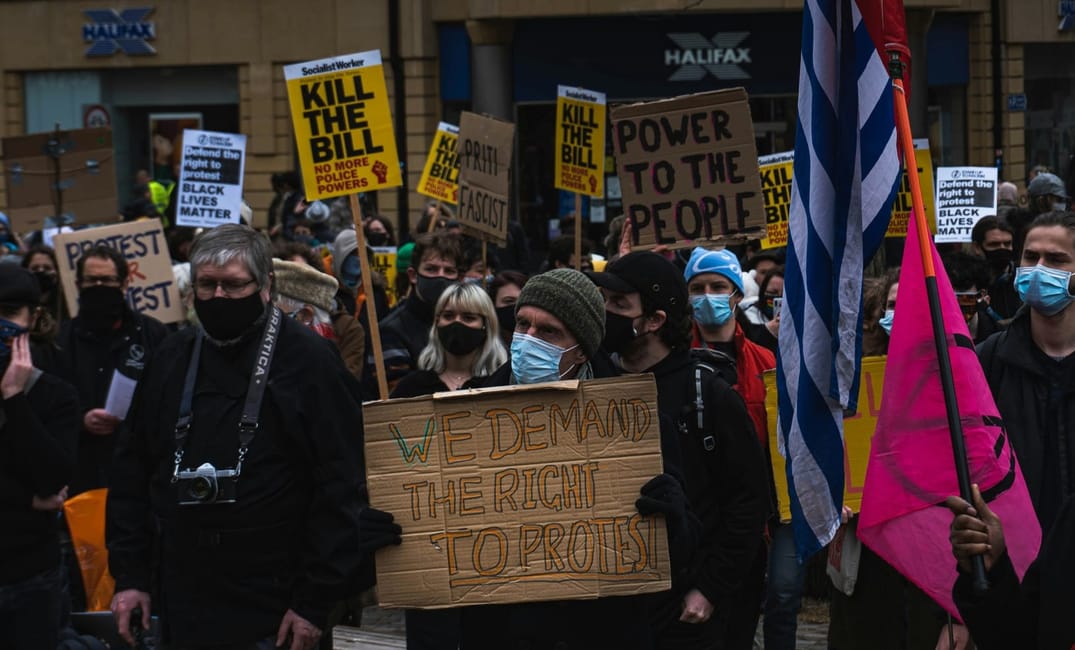James Morely
There is no right more fundamental to a functioning democracy than the right to protest; the right to have your voice heard any time and any place. Without this right then a democracy is hollow and meaningless. There are dozens of nations across the world where people have the right to show up and cast a ballot in regular elections, but where this process is a formality at best and any dissent between these state approved moments of engagement are met with hostility, criminality, and violence.
Falling into one of these pseudo-democratic states is not something any citizen wants, and yet Britain inches ever close to this. The new Police, Crime, and Sentencing bill would give the Home Secretary (the government minister in charge of security in the UK) and police more powers to stop the activities of protesters to ensure that they don’t cause “disruption”.
This includes giving the home secretary the power to define what constitutes serious disruption without Parliament’s approval. The home secretary, and by extension the Prime Minister, will have the power to change the law arbitrarily where protests are concerned, and the police will have more powers to break up protests that the Home secretary doesn’t agree with. Sentences will be harsher for those who damage property or who ignore the arbitrary orders of the home office.
When challenged that these restrictions could affect the right to protest the response from Conservative MPs has been to reaffirm their commitment to “peaceful” protests, and that this law would not affect those who protest “peacefully”. This response doesn’t actually address the concerns of those who have challenged the legislation and also reveals just how toothless they want to make protesting. Enforcing a peaceful requirement on protesters is essentially making protesters ineffective.
Potted plants are peaceful, pipe music is peaceful, a gentle stream is peaceful. None of them change the policies of governments. Protests should not be peaceful, protests should be loud. They should be a cacophony of anger, hope, and determination. They should be so loud, so big, so annoying that people can’t help looking out of their office windows, cars, and homes to see what has shaken up their daily routine for this brief moment of time. Disruption is the price we have to pay and we should want to pay, to be able to create change and awareness in the country we call home.
There seems to be an idea that the only other option to violent riots, where people and homes are destroyed, is a peaceful drum circle that looks like a modern art installation. There is an in-between, a middle ground where most protests fall and where real change can be achieved. Martin Luther King Jr. was an advocate of nonviolent resistance but that doesn’t mean he only supported silent placard holding. The methods of protest cause disruption. King was jailed for disrupting the functions of a business by supporting the Montgomery bus boycott. Sit-ins and pickets at racially segregated businesses were designed to disrupt their ability to continue operating as they were. Protesters like King understood that protests should disrupt the status quo that so many of us spend our lives within: “Nonviolent direct action seeks to create such a crisis and foster such a tension that a community which has constantly refused to negotiate is forced to confront the issue”.
This ability to disrupt the lives of others around them is what makes protesters so important. It should be hard to drive to work when people are protesting. Businesses should lose out on profits when people are protesting. Public places should be difficult to access when people are protesting. Protesters should force people to look at an issue they have ignored so far, they should draw the eye of everyone who is just trying to go about their lives because that is how you activate change.
Most people would never know who Edward Colston was, or his history as a slaver, if it weren’t for the BLM protests that tore down his statue. People may not have known Churchill’s racist and racially motivated activities and beliefs if it wasn’t for the person who scrawled racist across his statue. The disruptive element of the protest drew attention to the claims of protesters about the ongoing issues surrounding race in the UK, in a way that an entirely peaceful protest may not have.
Protests should not cause harm, they should not ruin lives or cause physical pain and suffering to people. There is a clear line between disruption and damage, between awareness and alarm, between inconvenient and dangerous. As a society we should constantly be re-evaluating that boundary and accepting the disruptive and inconvenient, whilst condemning the dangerous and violent.
The power to decide that line should not rest with the government alone as this bill proposes, it should be a constant meaningful debate that, yes, involves protests. Active engagement is the cornerstone of democracy and the bill currently in parliament aims to make it useless, effectively stripping back our democracy to one of empty formality and passive participation in a flawed electoral system. This bill must be opposed.
If you are concerned about the impact of the Policing, Crime, Sentencing and Courts Bill, you can use this letter template from Sara Motaghian to write to your Member of Parliament. You can also sign the Network for Police Monitoring petition which calls for the government to drop the bill.
Thanks for reading our article! We know young people’s opinions matter and really appreciate everyone who reads us.
Give us a follow on Instagram, Twitter and Facebook to stay up to date with what young people think.

